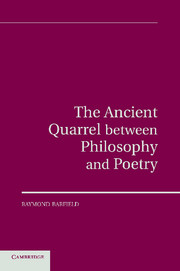Book contents
- Frontmatter
- Contents
- Acknowledgments
- Introduction
- 1 Socrates, Plato, and the Invention of the Ancient Quarrel
- 2 Aristotle, Poetry, and Ethics
- 3 Plotinus, Augustine, and Strange Sweetness
- 4 Boethius, Dionysius, and the Forms
- 5 Thomas and Some Thomists
- 6 Vico's New Science
- 7 Kant and His Students on the Genius of Nature
- 8 Hegel and the Owl of Minerva
- 9 Kierkegaard: A Poet, Alas
- 10 Dilthey: Poetry and the Escape from Metaphysics
- 11 Nietzsche, Heidegger, and the Saving Power of Poetry
- 12 Mikhail Bakhtin and Novelistic Consciousness
- Index
- References
Introduction
Published online by Cambridge University Press: 03 May 2011
- Frontmatter
- Contents
- Acknowledgments
- Introduction
- 1 Socrates, Plato, and the Invention of the Ancient Quarrel
- 2 Aristotle, Poetry, and Ethics
- 3 Plotinus, Augustine, and Strange Sweetness
- 4 Boethius, Dionysius, and the Forms
- 5 Thomas and Some Thomists
- 6 Vico's New Science
- 7 Kant and His Students on the Genius of Nature
- 8 Hegel and the Owl of Minerva
- 9 Kierkegaard: A Poet, Alas
- 10 Dilthey: Poetry and the Escape from Metaphysics
- 11 Nietzsche, Heidegger, and the Saving Power of Poetry
- 12 Mikhail Bakhtin and Novelistic Consciousness
- Index
- References
Summary
Western philosophy, from early in its history, has characterized itself in part by distinguishing how its statements and methods were different from those of the poets and, having made this distinction, what role the work of poetry was to have in philosophy. This book examines some of the philosophical writers who have participated in this effort. At the beginning of this story, Plato defined the relationship between poetry and philosophy as a quarrel, indeed, as an ancient quarrel. One theme in this book is that the so-called ancient quarrel between poetry and philosophy is itself neither poetry nor philosophy. Rather, it is an image portraying the interaction of poetry and philosophy as important for the pursuit of insight into the truth of things human and divine, a truth less accessible both to poets devoid of philosophy and to philosophers devoid of poetry. The domain of the quarrel is one that longs for a certain fullness of thought that goes beyond the exigencies of inquiry confined to the boundaries of either poetry or philosophy. Whether reluctantly or not, the philosophers addressed here acknowledge the importance of poetry to philosophy by acknowledging the peculiarity and value of the poets' insights, by using the tools of the poets in their own work, or by struggling to put the poets in their proper place.
Plato fretted over the poets' claims to wisdom and, in particular, their claims to sometimes be speaking for the gods.
- Type
- Chapter
- Information
- Publisher: Cambridge University PressPrint publication year: 2011

